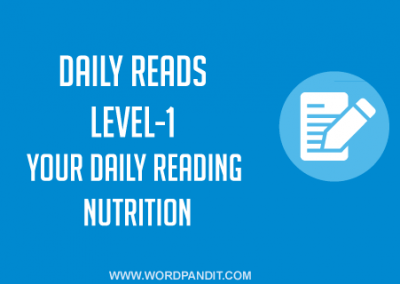Reading Suggestion-1
Article Name: As important as the three ‘R’s
Author Name: R Srinivasan
Source: The Hindu
Category: Technology
Summary for this article:
The writer starts by talking about the recent ransomware attack that hit lakhs of computers worldwide last week, India being one of the worst affected countries. He says that in spite of Cybersecurity measures being taken unless one knows how to differentiate genuine entities from any prank content being available in the web no security programme can be of any help
In spite of being the world’s largest digital population, only 10% of Indians are digitally literate says one study. There is a high need for the government to understand the difference between being digitally skilled and digitally literate, the latter being the need of the hour.
The major difference between two is: a digitally skilled person knows how to do the basic things in the computer while a digitally literate person knows not only to access the Internet but also to use it in a discerning manner.
He stresses on the importance of incorporating digital literacy right from the primary school and says that the government is now becoming aware and curricula are being slowly changed to include this. The writer ends this article in an optimistic note by saying that we have to ensure that we leave none behind. We can do it, he says!
Words to learn from this article:
Hyperdrive: Excessively fast
Aftermath: Consequence
Reams: Large piece of writing/ to criticise someone
Teeming: To bring forth or produce
Newbies: A new entrant in any field
Glacial pace: Slow pace
Reading Suggestion-1: Click to read full article
Reading Suggestion-2
Article Name: Illusions of a recovery
Author Name: Editorial Team
Source: Frontline
Category: Business and Economy
Summary for this article:
This is one of the most comprehensive articles that you can read on the global economy. Packed with facts and figures, this article goes on to explain how the current growth in the global markets needs to be viewed with scepticism. Charting the growth of the economy, especially the Chinese and Indian economies, during the last few years, the author goes on to state the various problems that impact different economies even today. Read this article to develop an understanding of the global economy and how it works currently.
Words to learn from this article:
Disconcerting: To make someone embarrassed, upset or confused
Distressing: Causing worry or anxiety
Inevitable: Unavoidable
Fiscal: Relating to finance
Throes: Violent pangs of suffering
Vulnerable: Susceptible to suffering or criticism
Reading Suggestion-2: Click to read full article
Reading Suggestion-3
Article Name: Migrant versus the West
Author Name: Khaled Ahmed
Source: The Indian Express
Category: Society
Summary for this article:
This article throws light to the fact that how a migrant’s identity transformation is based on the factors that form the Western mind today.
This paragraph compares the conditions of Jews in Europe to that of Muslim related racism and resentment prevalent in Europe today. France and Britain along with others are beginning to show their backs to the Muslims. Globalisation, says the writer is finally being questioned as it has squashed the welfare-oriented economies and the capitalism’s success.
The west received immigrants because of available cheap labour disarming the European nations. Many dysfunctional new states started seeking livelihoods in the west after the post-colonial conflicts. As a result, today we see a crisis where capitalism is being trapped by populism
The writer says that populism in the west is attacking the Muslims, stating obvious reasons by giving examples of the Muslims in Britain and France
He ends by saying that there is no denial how dark the populist feelings are, transformation of a migrant’s identity is based on the factors that form the Western mind today says the writer.
Words to learn from this article:
Ghettoised: To place anything in a ghetto (a poor place in the country)
Moot: To introduce any idea or subject for discussion
Dysfunction: To function abnormally
Populism: Relating to any political party which says to represent the general public
Sharia: Muslim religious laws
Expatriate: To ban or exile
Expat: One who has been expatriated
Wrested: To take or achieve something with much effort
Backlash: Strong public reaction to something.














Things need a clarification on :
“seasonally adjusted annual growth rates elsewhere in the G7 are stagnant ” What is G7 and seasonally adjusted growth rates ?
(this is in the second paragraph)
What do they mean by “shifting from monetary to fiscal stimulus ” ? What is a fiscal stimulus ?( in paragraph 7 )
Hi TS
The answers to your questions:
G7 refers to these countries: https://en.wikipedia.org/wiki/Group_of_Seven
The Group of 7 (G7) is a group consisting of Canada, France, Germany, Italy, Japan, the United Kingdom, and the United States. The European Union is also represented within the G7.
The Seasonally Adjusted Annual Rate (SAAR) is a rate that is adjusted to take into account fluctuations of values in the data which might occur due to seasonality. Such data would be affected by the time of the year and thus it would be misleading to draw comparisons month-to-month all year long. An example would be car sales,[1][2] occupancy rates of ski resorts, which would by default be higher during winter as compared to summer. Sales between these two seasons can only be fairly compared through seasonally adjusted rates. The SAAR is calculated by dividing the unadjusted annual rate for the month by its seasonality factor and creating an adjusted annual rate for the month.
Difference Between Monetory and Fiscal Stimulus:
Fiscal Stimulus Pumping money into the economy, usually through some sort of lowering of taxes or increase of government spending. Monetary Policy Managing the overall supply of money (i.e. interest rates). Lowering interest rates is a way to pump money into the economy through banks
shifting from monetary to fiscal stimulus: Means instead of controlling bank rates, govt putting in money directly into the economy
Hope this helps..:)
Wordpandit
Well summarized!
Thanks Shivangi
Wordpandit